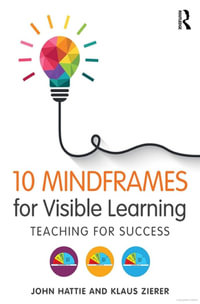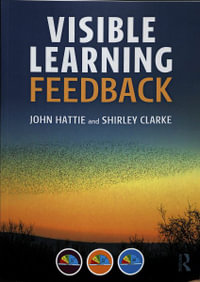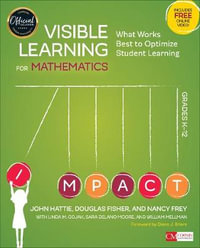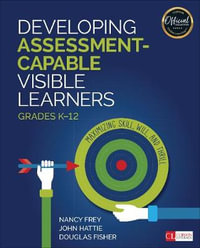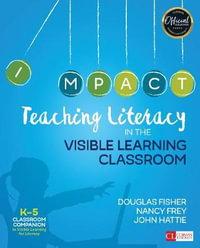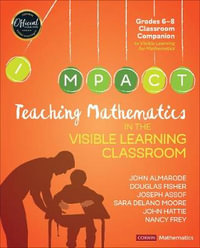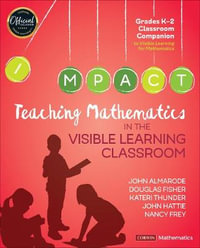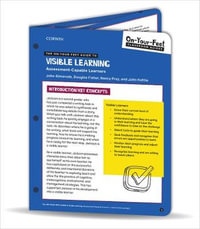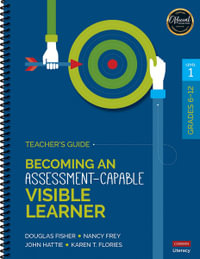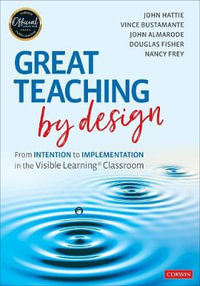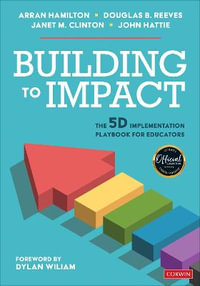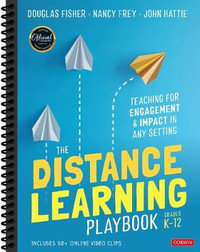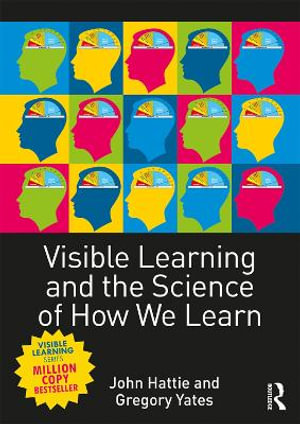
Visible Learning and the Science of How We Learn
By: John Hattie, Gregory Yates
Paperback | 27 September 2013 | Edition Number 1
At a Glance
368 Pages
24.5 x 17.5 x 2.5
Paperback
RRP $73.99
$58.50
21%OFF
or 4 interest-free payments of $14.63 with
orAims to ship in 7 to 10 business days
On publication in 2009 John Hattie's Visible Learning presented the biggest ever collection of research into what actually work in schools to improve children's learning. Not what was fashionable, not what political and educational vested interests wanted to champion, but what actually produced the best results in terms of improving learning and educational outcomes. It became an instant bestseller and was described by the TES as revealing education's `holy grail'.
Now in this latest book, John Hattie has joined forces with cognitive psychologist Greg Yates to build on the original data and legacy of the Visible Learning project, showing how it's underlying ideas and the cutting edge of cognitive science can form a powerful and complimentary framework for shaping learning in the classroom and beyond.
Visible Learning and the Science of How We Learn explains the major principles and strategies of learning, outlining why it can be so hard sometimes, and yet easy on other occasions. Aimed at teachers and students, it is written in an accessible and engaging style and can be read cover to cover, or used on a chapter-by-chapter basis for essay writing or staff development.
The book is structured in three parts - `learning within classrooms', `learning foundations', which explains the cognitive building blocks of knowledge acquisition and `know thyself' which explores, confidence and self-knowledge. It also features extensive interactive appendices containing study guide questions to encourage critical thinking, annotated bibliographic entries with recommendations for further reading, links to relevant websites and YouTube clips. Throughout, the authors draw upon the latest international research into how the learning process works and how to maximise impact on students, covering such topics as:
- teacher personality;
- expertise and teacher-student relationships;
- how knowledge is stored and the impact of cognitive load;
- thinking fast and thinking slow;
- the psychology of self-control;
- the role of conversation at school and at home;
- invisible gorillas and the IKEA effect;
- digital native theory;
- myths and fallacies about how people learn.
Industry Reviews
"The book is full of useful insights and ideas and is both readable and accessible. I recommend it to teacher trainees as well as trained teachers for continuing professional development and reflective practice." - Helen Williams, Teacher Training Co-ordinator at West Herts College and an Institute for Learning Fellow
"This book should be on the compulsory reading list for all students undertaking teacher education courses in Australia and elsewhere. In addition, it will be of great value to teachers who are already serving-because they can now access essential information about learning and teaching that was almost certainly neglected in the methodology courses they undertook in their pre-service years. A third group of educators who would benefit greatly from exposure to the book are the teacher-educators who currently deliver such methodology courses." - Peter Westwood, freelance writer and editor, Australian Journal of Learning Difficulties
"There is so much of interest here that you will find it difficult to put this book down. The questions are timely and relevant, and the answers, while often surprising, occassionally irritating, and sometimes amazing, are always worth knowing." - Graeme Whyte, Rudolf Steiner Schools, Special Children Magazine
"...this book is an accessible collection of engaging examples drawn from a broad body of cognitive, social and even biological (see the section on mirror neurons) psychology research with important implications for teaching and learning. 'The strength of this book lies in its fascinating cast of research characters; chameleons, gorillas, and monkeys all have their parts to play in helping the reader understand and apply principles of learning. 'The book has helpful pedagogical strategies embedded throughout and is most appropriate for readers new to this area of research. Experts who are familiar with the basic tenets of cognitive psychology or who closely follow current developments in the scholarship of teaching and learning may find many of the examples familiar, however with such a broad array of research presented, even seasoned researchers will likely find something new to explore." - Melissa Birkett, Department of Psychology, Nortern Arizona University, Psychology Leaning and Teaching
"This is a worthwhile and useful volume. It covers the field of what makes teachers effective in the classroom. Its strength is in (1) making often complex concepts accessible in both writing and the format of the book; (2) providing balanced, research-informed coverage of concepts related to the complex acts of teaching and learning, and (3) helping teachers and instructors make the shift from over-focusing on the teaching act to appreciation and understanding of the process of learning as experienced by students." - Reflective Teaching
"I will never forget the moment that I discovered John Hattie's work. It completely blew my mind, the fact that all of this research was out there and could inform my teaching. This fantastic updated edition brings in a whole raft of key ideas from cognitive science. This book makes a fantastic summer read - fill yourself with excitement about new possibilities for unlocking new learning next year." - David Weston, author
"Chunky and unashamedly academic in appearance 'Visible Learning and the Science of How We Learn' (2014) doesn't scream 'holiday reading'. Nevertheless this book by John Hattie and Gregory Yates is surprisingly hard to put down. Combining the lessons of Hattie's extraordinary Visible Learning project with insights from cognitive science, there are particularly powerful sections on relationships, feedback, memory, confidence and self-control. As in all of Hattie's work, the style combines rigour with readability, passion with precision." - Matt Lloyd-Rose, social researcher, NGO leader and writer.
2. Is knowledge an obstacle to teaching?;
3. The teacher-student relationship;
4. Your personality as teacher: Can your students trust you?;
5. Time as a global indicator of classroom learning;
6. The recitation and the nature of classroom learning;
7. Teaching for automaticity in basic academic skill;
8. The role of feedback;
9. Acquiring complex skills though social modelling and explicit teaching;
10. Just what does expertise look like?;
11. Just how does expertise develop?;
12. Expertise in the domain of classroom teaching;
13: How knowledge is acquired;
14. How knowledge is stored in the mind;l
15. Does learning need to be conscious? What is the hidden role of gesture?;
16. The impact of cognitive loa;
17. Your memory and how it develops;
18. Mnemonics as sport, art, and instructional tools;
19. Analysing your students' style of learning;
20. Multitasking: A widely held fallacy;
21. Your students are digital natives. Or are they?;
22. Is the Internet turning us into shallow thinkers?;
23. How does music affect learning?;
24. Confidence and its three hidden levels;
25. Self-enhancement and the dumb-and-dumber effect;
26. Achieving self-control;
27. Neuroscience of the smile: A fundamental tool in teaching;
28. The surprising advantages of being a social chameleon;
29. Invisible gorillas, inattentional blindness, and paying attention;
30. Thinking fast and thinking slow - your debt to the inner robot;
31. IKEA, effort, and valuing
ISBN: 9780415704991
ISBN-10: 0415704995
Published: 27th September 2013
Format: Paperback
Language: English
Number of Pages: 368
Audience: Professional and Scholarly
Publisher: Taylor & Francis Ltd
Country of Publication: GB
Edition Number: 1
Dimensions (cm): 24.5 x 17.5 x 2.5
Weight (kg): 0.64
Shipping
| Standard Shipping | Express Shipping | |
|---|---|---|
| Metro postcodes: | $9.99 | $14.95 |
| Regional postcodes: | $9.99 | $14.95 |
| Rural postcodes: | $9.99 | $14.95 |
How to return your order
At Booktopia, we offer hassle-free returns in accordance with our returns policy. If you wish to return an item, please get in touch with Booktopia Customer Care.
Additional postage charges may be applicable.
Defective items
If there is a problem with any of the items received for your order then the Booktopia Customer Care team is ready to assist you.
For more info please visit our Help Centre.
You Can Find This Book In
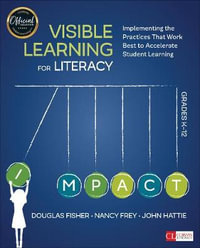
Visible Learning for Literacy, Grades K-12
Implementing the Practices That Work Best to Accelerate Student Learning
Paperback
RRP $83.99
$51.75
OFF

Visible Learning for Literacy, Grades K-12
Implementing the Practices That Work Best to Accelerate Student Learning
Paperback
RRP $83.99
$51.75
OFF
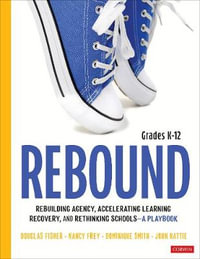
Rebound, Grades K-12
A Playbook for Rebuilding Agency, Accelerating Learning Recovery, and Rethinking Schools
Spiral Ringed Book
RRP $55.00
$49.90
This product is categorised by
- Non-FictionEducationEducational Psychology
- Non-FictionPsychologyCognition & Cognitive PsychologyLearning
- Text BooksTextbook FinderMurdoch UniversityEDN584 Strategies for Effective Learning & Teaching in Secondary Schools
- Text BooksTextbook FinderMurdoch UniversityEDN568 Strategies for Effective Learning & Teaching
- Text BooksTextbook FinderMurdoch UniversityEDN221 Learning & Teaching
- Kids & Children's BooksEducational Material
- Non-FictionEducationHigher & Further EducationTeacher Training
